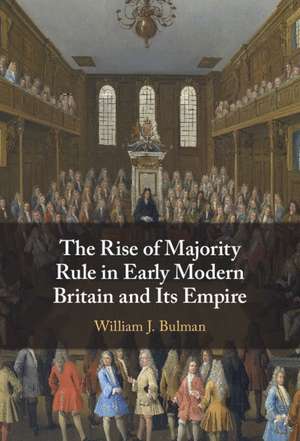The Rise of Majority Rule in Early Modern Britain and Its Empire
Autor William J. Bulmanen Limba Engleză Paperback – 15 feb 2023
| Toate formatele și edițiile | Preț | Express |
|---|---|---|
| Paperback (1) | 204.86 lei 6-8 săpt. | |
| Cambridge University Press – 15 feb 2023 | 204.86 lei 6-8 săpt. | |
| Hardback (1) | 600.84 lei 6-8 săpt. | |
| Cambridge University Press – 31 mar 2021 | 600.84 lei 6-8 săpt. |
Preț: 204.86 lei
Nou
Puncte Express: 307
Preț estimativ în valută:
39.20€ • 41.92$ • 32.68£
39.20€ • 41.92$ • 32.68£
Carte tipărită la comandă
Livrare economică 18 aprilie-02 mai
Preluare comenzi: 021 569.72.76
Specificații
ISBN-13: 9781108829205
ISBN-10: 1108829201
Pagini: 293
Dimensiuni: 228 x 152 x 18 mm
Greutate: 0.4 kg
Editura: Cambridge University Press
Colecția Cambridge University Press
Locul publicării:Cambridge, United Kingdom
ISBN-10: 1108829201
Pagini: 293
Dimensiuni: 228 x 152 x 18 mm
Greutate: 0.4 kg
Editura: Cambridge University Press
Colecția Cambridge University Press
Locul publicării:Cambridge, United Kingdom
Cuprins
1. Introduction; 2. Consensus in the Commons, 1547–1642; 3. Consensus imperiled, 1640–1641; 4. Consensus destroyed, 1641–1643; 5. Revolutionary decisions, 1643–1660; 6. The majority institutionalized, 1660–1800; 7. Little parliaments in the Atlantic Colonies, 1613–1789; 8. Conclusion.
Recenzii
'Finally, a history of majority voting! The advent and development of this crucial yet odd feature of modern democracy has long gone unexamined. In this erudite and methodologically sophisticated study, William Bulman fully remedies this situation. The result is a must-read for historians and political scientists alike.' Sophia Rosenfeld, University of Pennsylvania
'With analytical precision, Bulman contextualises the origins of majoritarian processes, and makes a powerful case for grounding political history in the development of institutional practices. The result is a brilliant and powerful book, which is conceptually sophisticated and methodologically innovative, and which develops a taut, challenging and historiographically important argument.' Jason Peacey, University College London
'This provocative study will interest historians and modern political observers alike, forcing us to rethink what we thought we already knew. Bulman renders puzzling and historicizable what has seemed obvious eternal truth - that majority voting is the inevitable way that political bodies make decisions.' Rachel Weil, Cornell University
William Bulman's book can offer … a great place to start thinking about how majority rule originated. Bulman has written an intellectually formidable and smartly argued book that every American political scholar can read profitably as we reflect on the current crisis of majority rule in the Republic.' Jack N. Rakove, Reviews in American History
'William J. Bulman's ambitious and extraordinarily successful monograph … will both enlighten the specific scholarly audience to which it is directed and delight the larger community of historians who admire work that does not cut corners or simplify developments to achieve a wider audience.' Jack P. Greene, The American Historical Review
'With analytical precision, Bulman contextualises the origins of majoritarian processes, and makes a powerful case for grounding political history in the development of institutional practices. The result is a brilliant and powerful book, which is conceptually sophisticated and methodologically innovative, and which develops a taut, challenging and historiographically important argument.' Jason Peacey, University College London
'This provocative study will interest historians and modern political observers alike, forcing us to rethink what we thought we already knew. Bulman renders puzzling and historicizable what has seemed obvious eternal truth - that majority voting is the inevitable way that political bodies make decisions.' Rachel Weil, Cornell University
William Bulman's book can offer … a great place to start thinking about how majority rule originated. Bulman has written an intellectually formidable and smartly argued book that every American political scholar can read profitably as we reflect on the current crisis of majority rule in the Republic.' Jack N. Rakove, Reviews in American History
'William J. Bulman's ambitious and extraordinarily successful monograph … will both enlighten the specific scholarly audience to which it is directed and delight the larger community of historians who admire work that does not cut corners or simplify developments to achieve a wider audience.' Jack P. Greene, The American Historical Review
Notă biografică
Descriere
Explores the emergence of majority rule in the elected assemblies of early modern Britain and its Atlantic colonies over two centuries.
